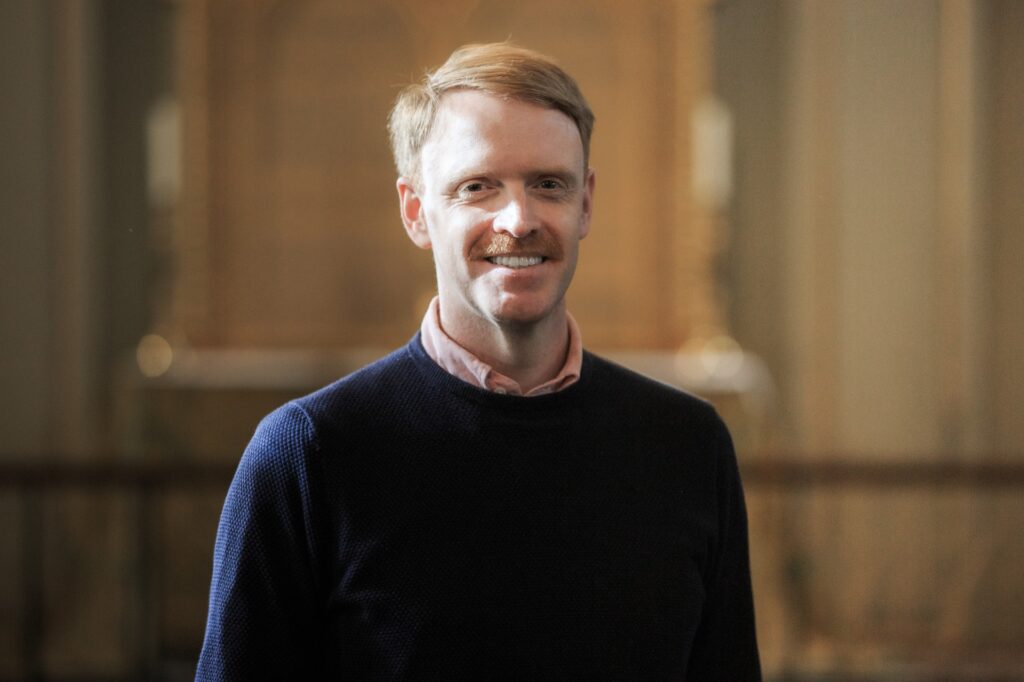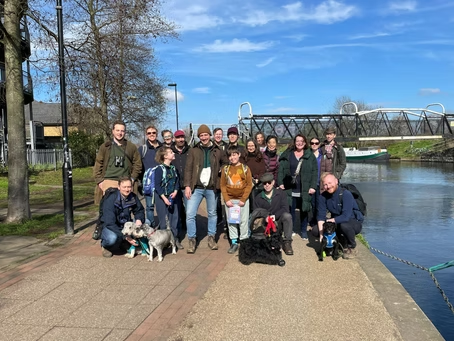Wil James, Licensed Lay Minister at St Giles-in-the-Fields explains how a discipleship focussed WhatsApp group is helping support spiritual formation within a scattered church community.
Wil James has been part of the St Giles-in-the-Fields church community for 15 years. Formerly a churchwarden, he is now a Licensed Lay Minister (LLM), a voluntary role he has held for about a year. Alongside his ministry, Wil runs his own business, which means his church presence is mostly on weekends. Like many in ministry today, he’s had to find ways to serve that are sustainable – working within the time he has while responding to real needs within the congregation.
“I was looking for a ministry that would fit the constraints I have on my time,” he says, “and also fill a need we perceived in the congregation.”
A Journey of Faith
Wil’s journey of faith began in Wales, where he was raised in a Christian family with roots in both the Church in Wales and the Welsh Baptist tradition. “It was kind of a hybrid experience,” he reflects. But like many, he drifted away from church in his late teens. It wasn’t until he moved to London in 2010 that he found a spiritual home again.
“I had been aware of looking for something,” he says of that in-between time, “but hadn’t really found it. Various encounters with organized religion hadn’t done it for me.” That changed when he walked into St Giles. “I felt a sense of welcome and connection. The rest of my journey has been shaped by that community.”

A Unique Context: St Giles-in-the-Fields
Situated in the heart of London’s West End, St Giles serves a highly distinctive parish encompassing parts of Covent Garden, Bloomsbury, and Fitzrovia. It’s a vibrant and complex area filled with artists, creatives, and those working in the night-time economy.
“There aren’t many residents,” Wil explains, “so it has characteristics of a city church. But we also have a very stable, long-term congregation, most of whom travel in from elsewhere.”
St Giles stands in the central tradition of the Church of England: formal, traditional worship rooted in the Book of Common Prayer, combined with an inclusive, open, and intellectually engaged theology. The result is a lively and growing congregation, with people of all ages – especially young adults – seeking baptism, confirmation, and spiritual growth.
Supporting Spiritual Development
With this growth has come a challenge: how to support people, particularly adults, after the initial milestones of baptism and confirmation. “What do you do next?” Wil asks. “Especially in a context like ours, where fellowship groups and in-person gatherings during the week are difficult because of how scattered our community is.”
The ministry team at St Giles – which includes an incumbent, curate, Self-Supporting Minister (SSM), and Wil as LLM – saw the need for a new approach.
“We wanted to create some kind of discipleship platform that was virtual in the first instance”, Wil explains. The solution came in the form of God’s Time, a WhatsApp group, geared towards discipleship, launched at the beginning of the year.
“It’s an open-ended forum,” Wil says. “People share prayers, reflections, questions about sermons, or anything that’s spiritually on their mind.” The aim is to nurture a regular, disciplined prayer life rooted in community. “We want to build familiarity with spiritual conversation, especially for people who don’t have deep social links within the church.”
The group, which Wil anticipated might attract a handful of participants, now has around 45 members -more than half the church’s electoral roll. The group includes students, retirees, weekday-only worshippers, and long-time members. “It’s become a low impact but effective way of encouraging discipleship and spiritual deepening.”
Cultivating a Culture of Prayer
A major resource for this initiative has been the Way of Life materials developed by London Diocese, which are simple, accessible guides to practices like meditative prayer and Lectio Divina. “Some of these practices can seem intimidating,” Wil notes, “especially when they have Latin names or feel unfamiliar. But the materials present them in a very approachable way.”
St Giles has also created a companion to prayer – a collection of different prayer styles to help individuals explore what works for them. “What’s been interesting is discovering how many people in the congregation are already praying in diverse ways,” Wil says. “They might not have a name for it, but there’s a real appetite for personal spirituality.”
Significantly, the group provides a sense of being linked in prayer with others. “People have said they’re encouraged to know others are praying too,” Wil notes. “They’re not doing this alone, but as part of a community of prayer”

Evolving into a Platform
God’s Time has already begun to bear fruit beyond the digital sphere. Before Easter, the church hosted a one-day in-person retreat, which was well attended. “It helped that we used the WhatsApp group as a rallying point. It created a forum for people to talk about the event beforehand.”
Plans are now forming for further events in the autumn, and the group continues to evolve as a springboard into wider church life, helping people discern their gifts and deepen their participation. “It’s creating a new part of the community,” Wil says. “Something organic and responsive, not top-down.”
Trusting the Process
Of course, opening a group like this carries risk. “It’s a leap of trust,” Wil acknowledges. “But we have some basic ground rules, and people generally stick to them.” The group is moderated and only lightly publicized within the church community. “It’s not a free-for-all. And it’s not the place for general chat. We make that clear.”
Surprisingly, the need for moderation has been minimal. “Maybe because we’re not that kind of church,” he adds with a smile. What’s more, the platform has prompted pastoral encounters, with people reaching out for help or prayer. “It highlights needs that we might otherwise have missed.”
The group has even welcomed those beyond the regular congregation – people who found St Giles while visiting or passing by. “I’ve encouraged them to talk to their local priest. We don’t know where an idea might land, especially in a central London church. Someone might only meet us once, but something can spark.”
A New Digital-Physical Balance
Unlike some pandemic legacies that have faded or been discarded, God’s Time represents something new. “It’s not trying to replicate church online,” Wil says. “We were very deliberate after COVID about encouraging people back to in-person worship. But this feels different. It’s an addition, not a substitute.”
Messages are posted; people respond when they can. There’s no livestreaming, no digital services—just an ongoing thread of prayer, connection, and spiritual curiosity. “It’s a new step, and I’d encourage others to try it – with guardrails. You might be surprised by how people respond.”
